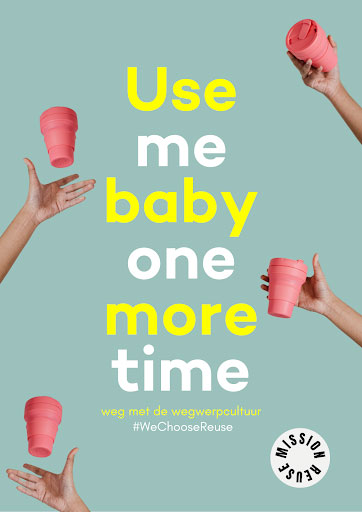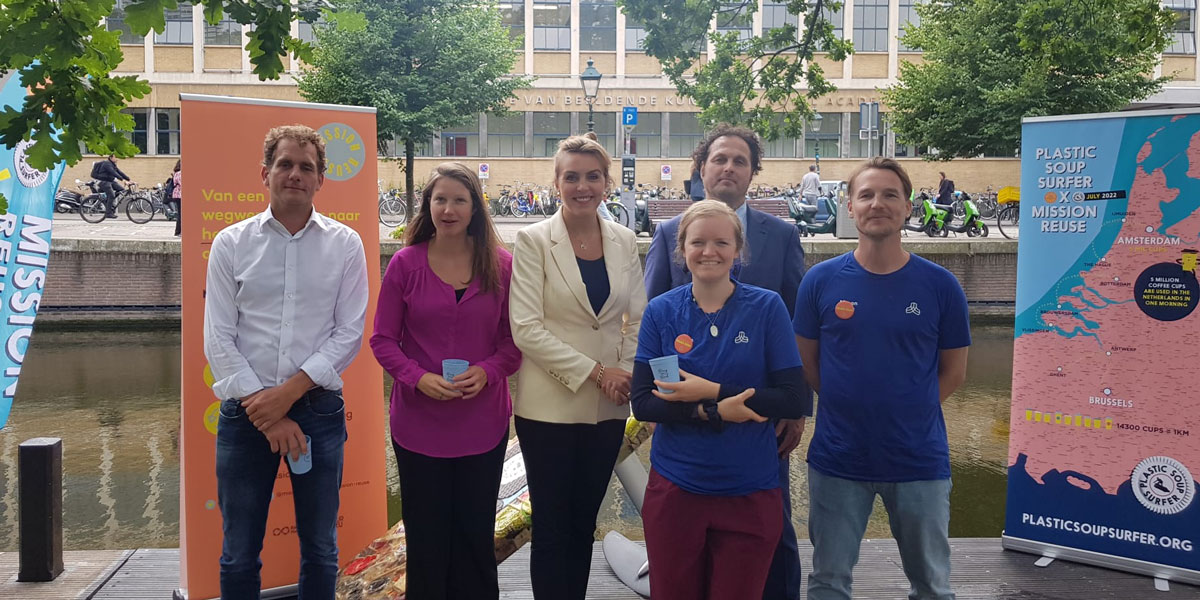Hi Mission Reuse! So who are you and where are you based/working?
Mission Reuse is an alliance (non-legal entity) of three Dutch organisations: Recycling Netwerk Benelux (RNB), Natuur & Milieu, and Enviu. In 2019, they joined forces to anchor reusable packaging in our society for good by leveraging the complementarity of their expertise. Our names are Emmy Van Daele (Project lead Reuse) and Karl Beerenfenger (Reuse Policy Coordinator).
Why are you working on the topic of plastic pollution/reuse? What motivates you?
Emmy: Having had a strong passion for nature since I was a child, I strive to reduce the climate impact of my daily life bit by bit. Some of my favourite things include preparing delicious plant based meals, repairing clothes and living in a cohousing project. At a certain point, even though I see the influence you can have as a consumer I also noticed its limitations, I wanted to contribute to systemic change on a larger scale. Mission Reuse does exactly that.
Karl: I’ve had a lifelong fascination for the aquatic realm and sharks in particular. I used to be both terrified and thrilled when my dad said ‘haai!’ (shark in Dutch) just before I went to sleep. As a privileged Westerner I’ve had the opportunity to scuba dive and freedive around the world. The more I experienced the beauty of our underwater kingdom, the more I felt an urge to protect it. Working on systemic change with Mission Reuse - shifting from disposables to reusables - I’m happy to play my part within my sphere of influence.
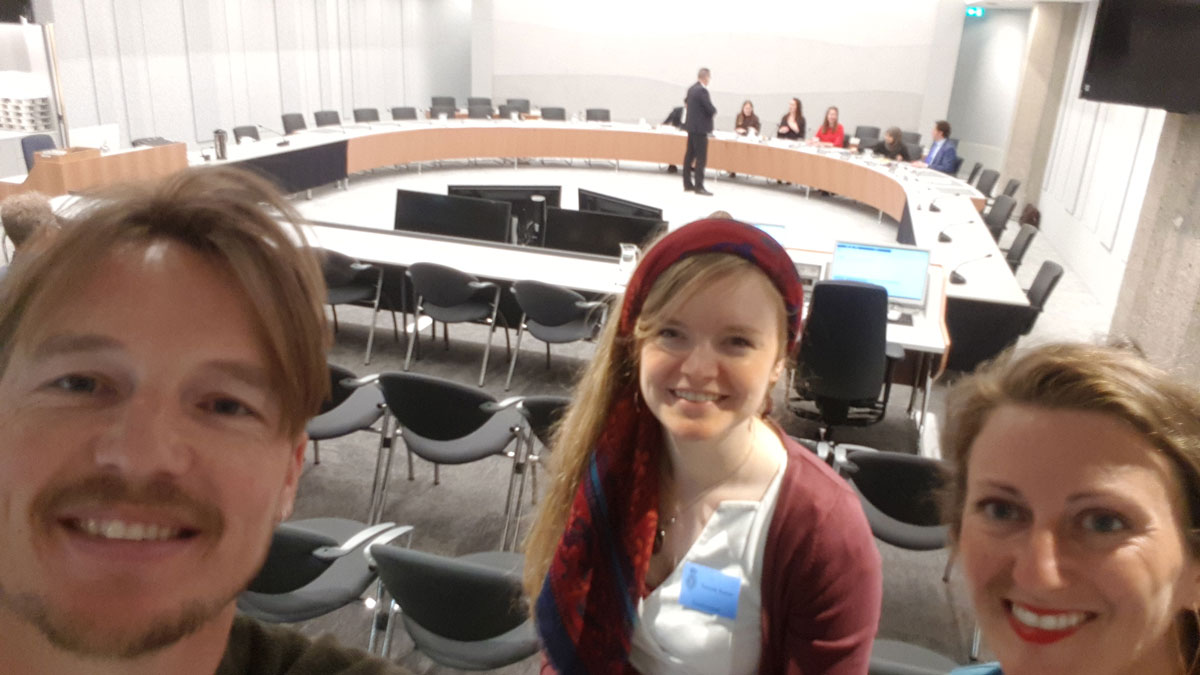
Emmy & Karl from Mission Reuse at the Dutch Parliament for the circular economy debates
Can you tell us a little bit about Mission Reuse? Where did the journey start and what does it aim to do?
Mission Reuse is a transition programme that powers the switch from disposables to reuse by combining policy work, knowledge sharing, narrative building and testing and scaling innovations. We test reusables concepts in practice including the needed infrastructure and return logistics. These tests take place in real settings, with real people where we can guarantee neutrality and , especially in settings where an independent party is favourable and where we can collect learnings to publicly share them. These practice examples support our advocacy work but also provide insights into the additional legislative framework that will is needed to allow these concepts to be replicated across Europe. We have focused mainly on reusable drinking cups, meal containers and e-commerce packaging.
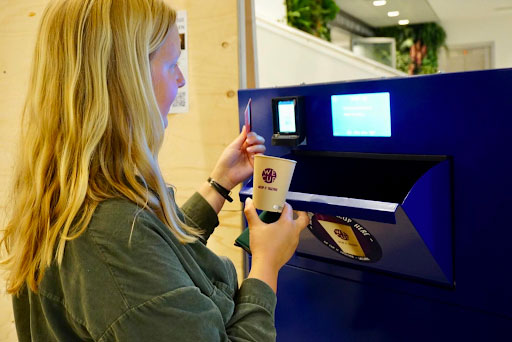
Mission Reuse researching and piloting a most scalable reuse system for the campus environment in Amsterdam
What do you think the future of reuse is in Europe?
An additional legislative push will be crucial to facilitate the transition, for example through the upcoming revision of the Packaging and Packaging Waste Directive. Some reuse systems like refillable beer bottles and cups at closed environments such as offices have proven successful implementation at scale in some countries. Obligations will speed up the transition throughout Europe and provide scale for reuse infrastructure, where establishing reuse streams can tap into. Reuse systems that are still being developed require action research to optimise customer engagement and return logistics. Strong binding prevention and reuse targets are needed to spark these developments.
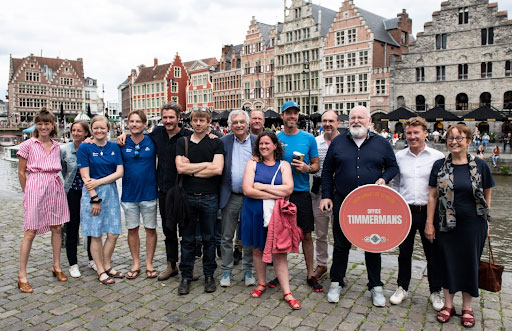
Mission Reuse in Ghent with reuse innovators and relevant policy makers at municipality, national and European level during our campaign about reusable coffee cups. The sign handed over to Frans Timmermans says: ‘’From single-use to reuse’’
How can Mission Reuse be supported further?
BFFP provides the ideal network to speed up knowledge exchange and feed those learnings into the transition towards prevention and reuse. To facilitate this exchange further we will also provide our reports and findings in English from now on. We have greatly benefitted from exchange and collaborations ourselves going from implementing learnings from abroad into our local policy recommendations to tapping into our joint network and expertise.
Support our work and the transition by pushing for the switch from disposable goods to reusable alternatives. Single-use glass has one of the largest CO2 footprints among packaging materials even though it is regarded as being very environmentally friendly. That's why we aim to not only tackle the plastic problem but also the single-use problem. Even with cardboard, we can switch towards prevention or reusable alternatives to maximise the packaging cycles before it needs to be recycled and produced again. As we want to optimise resource use on all levels, the switch towards more reuse alternatives goes beyond plastic packaging. Single-use cardboard and glass packaging have also significant environmental impact and viable reuse solutions are emerging. Support our work and the transition by pushing for the switch from disposable goods to reusable alternatives.
